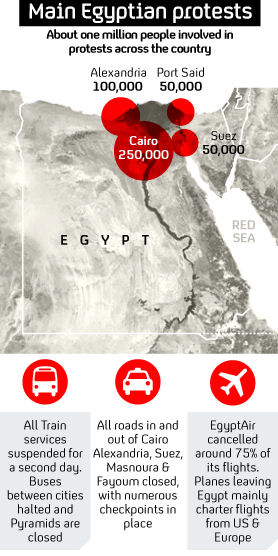Egypt’s President Mubarak will not seek re-election
President Hosni Mubarak tells Egypt he will not seek re-election in September, but Barack Obama says the time for change is now. It means the protests will continue, reports Jonathan Rugman in Cairo.
On state television, the president promised constitutional reform, but said he wanted to stay to the end of his term in September to ensure smooth transition.
Hosni Mubarak said: “I say in all honesty and regardless of the current situation, that I did not intend to nominate myself for a new Presidential term. I’ve spent enough years of my life in the service of Egypt and its people.
“I am now absolutely determined to finish my work for the nation in a way that ensures handing over its safekeeping and banner … preserving its legitimacy and respecting the constitution… I will work in the remaining months of my term to take the steps to ensure peaceful transfer of power.”

He pledged to step down at the point of the next election after a week of protests across Egypt, with up to one million reported to be marching across the country calling for an end to President Mubarak’s 30-year rule.
However, Mr Mubarak’s statement is unlikely to appease the protesters, Channel 4 News Correspondent Jonathan Rugman, in Cairo, said.
The protesters don’t want Mubarak to have a graceful exit, so the instability will continue. Jonathan Rugman
“He can try and hold on until the elections later this year and have a graceful exit. But the protesters don’t want him to have a graceful exit, so the instability will continue,” he said.
In Tahrir Square, which has been the centre of the demonstrations – and is still packed with protesters now – the resignation statement was met with angry chants of “leave, leave!”.
Our correspondent tweeted the crowd’s instant verdict: “It is not Mubarak’s decision when to leave. It is ours. Go now #jan25 #egypt.”
Follow @jrug for latest updates from Egypt
Mr Mubarak also drew on his military past defending Egypt in war, saying he would not leave the country.
Obama: change ‘must begin now’
US President Barack Obama has said a transition of power in Egypt “must begin now”.
“The President had a direct and frank conversation with President Mubarak,” a White House official said, describing Obama’s 30 minute telephone discussion with the Egyptian leader.
“He said it was clear how much he loves his country, and how difficult this is for him. President Obama also explained to him that an orderly transition can’t be prolonged – it must begin now,” the spokesman said.
‘Biggest change since World War II’
Channel 4 News has spoken to ex-US Secretary of State, Henry Kissinger, about the Egypt instability.
“It’s conceivable that governments emerge that will deal with issues on a pragmatic basis as they arrive, but if the contingency that you describe were to arise that Islamic governments appear in opposition to the West – and following some of the foreign policy of, say, of the Iranian government – then that would be a fundamental change in the kind of world that we have known since the end of World War 2.
“We would have a duty to begin living with it and to understand it, but we shouldn’t delude ourselves that this would not be a radical change in the international environment.”
For more on Egypt's power map, see Who Knows Who on Mubarak
Peaceful protests
Across Egypt, demonstrators have gathered for days for protests in the Arab world’s most populous nation, of 80 million people.
Will the protests have a domino effect in the rest of the Arab world?
Huge protests took place in other major Egyptian cities including Alexandria and Suez, which last week saw violent riots between demonstrators and police. In the capital Cairo, 250,000 rallied in Tahrir Square, the focal point of the demonstrations against Mubarak and Egypt’s wider socio-economic problems, including high unemployment.